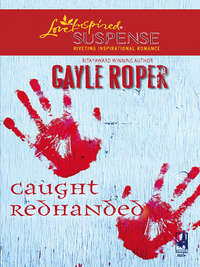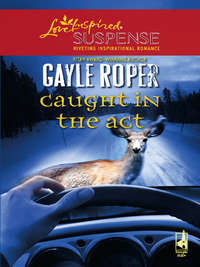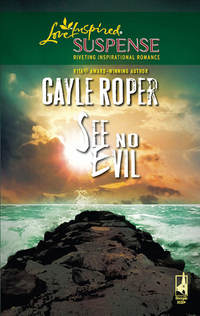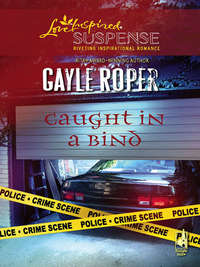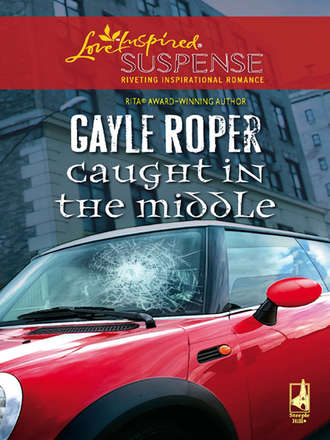
Полная версия
Caught In The Middle
“Oh. Well. I don’t think so,” I said. “I’ve only lived in Amhearst since the beginning of September.”
He shook his head and squinted at me.
I flipped my notebook open and asked, “Don’t you find painting and coaching a strange combination?”
He took the hint and got right to the issue at hand.
“Painting and coaching are good foils for each other if you think about it. Painting is creative and energizing and sedentary and solitary. Coaching is restorative and repetitious and active and social.”
By the time the interview drew to a close thirty minutes later, I knew Curt laughed a lot, talked with his hands and had a lot of work still to do for tomorrow night’s opening.
“This article will be in Friday’s paper,” he told me, as if it was his choice. “Right?”
“Probably Saturday’s edition,” I said.
“I’d like it to be in tomorrow’s.”
“I don’t think you get to choose. It’s the editor’s call.” I smiled so I wouldn’t sound defensive, but I hate it when people try to tell me what to do with the articles about them, especially since I have no control over when anything is printed, only when it’s written. “If it comes out Saturday, I can cover the opening tomorrow night and people can read about it in time to stop in Saturday if they wish.”
He nodded, not overly happy but wisely recognizing that he had no say in the issue. “Why don’t you come and see the chaos tonight or tomorrow morning? Then by contrast, the professionalism of tomorrow night will really impress you—I hope.”
“Thanks,” I said. “I’ll have to see. I know I can’t come tonight, but maybe tomorrow. It depends on what else I’m assigned to do.”
“Tell Don I said to let you come,” said Curt.
“You know Don?” I asked.
Curt’s smile dimmed. “Yes. I know Don.”
FOUR
I returned to The News to find the office in an uproar. Don was waving his hands as he talked to Mac Carnuccio. Mac was listening intently, looking like the proverbial thundercloud. Larry Schimmer, the sports guy, and Edie Whatley, the family and entertainment editor, were deep in conversation at Edie’s desk. Edie was wiping at tears that continued to flow despite her mopping efforts.
I stopped at Jolene’s desk. She was staring at her computer screen, the earplug for her transcriber in place, but she wasn’t working.
“What’s wrong?” I asked.
Jolene transferred her blank stare to me. She had gorgeous skin, great brown eyes that she dramatized expertly, and enough hair to make Dolly Parton jealous, though Jolene’s was a rich chestnut. “Oh, Merry, isn’t it terrible?”
“What? What’s wrong?”
“It’s Trudy McGilpin. She’s dead.”
“Trudy? Trudy the mayor? But all she had was the flu! At least that’s what they told us yesterday evening at her office when she didn’t show up for the meeting.”
Jolene nodded. “But she died sometime last night. We got a call about it just a few minutes ago. She didn’t keep her morning appointments, and her secretary couldn’t reach her by phone. She got worried and went to Trudy’s, and—” Jolene paused, then continued with great drama. “And there she was.”
I sympathized with the unknown secretary. I knew that finding bodies could take the starch out of the crispest individual.
Jolene, whose husband had just left her, took a long and shaky breath. “That just shows what happens when you live alone.”
I blinked. “I doubt that living alone did her in, but she must have been a lot sicker than anyone realized.”
“A lot,” agreed Jolene as she coughed delicately and leaned toward me. “I don’t feel like I have a fever, do I?”
I looked at her carefully made-up face and her clear eyes.
“You look fine to me, Jolene.”
She leaned forward some more, one hand raising her bangs off her forehead. “I don’t know. Check for me.”
I placed a couple of fingers on her cool forehead and looked thoughtful.
“I knew it,” she said, distressed. “I’m getting sick.”
“You’re fine,” I said.
“But you frowned.”
“I was thinking about Trudy,” I said.
“Well, think about me. Do I have a fever?”
I shook my head. “You do not.”
She didn’t believe me. “But I know I’m getting sick.”
“Merry!” Don’s voice boomed across the room. “Come here. And, Mac, I need you, too.”
Thank you, Don! I eagerly left the sick bay.
The News office space was cramped, old and reeked of smoke in spite of the fact that no one had been allowed to smoke in the room for at least five years. The desks were battered and scarred, the linoleum pattern had worn off decades ago and the file cabinets were dented and scratched. Only the lighting and the computer system were modern, and they were both state-of-the-art.
The other highly unique aspect of the newsroom was the greenery. Plants sat on every available surface and on some they shouldn’t. And every plant was lush and full and in better health than I was. I could only imagine what Don paid a service to tend these beauties, though why he wanted them in the first place, I didn’t know.
I dodged Larry’s and Edie’s desks, the fiche machine and the soda and coffee machines. The latter two were placed near Don so he could keep an eye on loiterers. A Wandering Jew draped over the soda machine in such rampant health that I always thought of Little Shop of Horrors and the plant that ate people. I gave the machine and its decoration wide berth.
“You heard?” Don asked as I approached.
“About Trudy?” I nodded. “Jolene just told me.”
I stared in surprise at my boss’s large, cluttered desk. Cluttered? Don? Usually he sat in organized splendor in front of the huge window that looked down from the second-floor editorial offices onto the business district of Amhearst. If it weren’t for the incontrovertible proof of the daily issues of The News, I’d think Don never worked, because his desk never showed it. Except now.
“I want you to do the personality obit. Contact family, friends, get some good quotes. You know. Mac will do the political and public-service analysis and contact the police and hospital.”
“The police?” I said, startled.
“They’re involved because it’s an unwitnessed death. Mere form,” said Mac. “I have to talk to them about your body, anyway.”
“It’s not my body!”
Mac grinned. “That’s not what I heard.”
“Mac, come on!”
“From what I hear, he seems about the right age for you.” He gave his trademark leer.
I wasn’t sure whether I should be offended by a joke about a dead man. “How old was he? And how old do you think I am?”
“I don’t know about you, but he was twenty-five.” Mac glanced at the notebook he had in his hand. “He lived at 594 Lyme Street with his mother, Liz, and worked as a grease jockey at Taggart’s.”
“So I got him at Taggart’s garage?”
“I don’t think the cops are certain yet, but that seems to be the theory they’re working with.”
“Excuse me, you two,” said Don curtly, “but I think we were talking about Trudy.”
I nodded, staring at my boss with interest. His hair was actually mussed where he had run a hand through it, revealing his incipient bald spot rather cruelly. I knew that if he could see himself, he’d be upset.
Don shuffled some papers into a haphazard pile. “Your articles about Trudy will be the leads in tomorrow’s edition. I want them by nine a.m.” He made a frustrated sound. “I hate it when a story breaks too late for the day’s edition.”
“Had Trudy known your feelings,” said Mac harshly, “I’m certain she would have arranged things differently.”
Don looked startled, like a mastiff bitten by a toy poodle. “You know I didn’t mean it that way, Mac. You know I respected Trudy. Now get to work, both of you.”
Mac and I turned away together, Mac still scowling. We walked across the office together, or as together as you can walk when there’s only enough room for one person at a time between the furniture. When we reached his desk, he grabbed his coat from the back of his chair.
“Any chance of dinner to talk over this case?” he asked as he stuffed his arms in the sleeves.
“Which case?” I asked.
“Either one’s okay with me,” he said, jettisoning the scowl and smiling with great charm. “It’s the company I’m interested in.”
I didn’t doubt that for an instant, and I was equally sure he wouldn’t want to stop with dinner. “I’m sorry,” I said. “I’m busy tonight.”
He looked at me skeptically, but I just smiled sweetly. I wasn’t about to tell him that my business was a rehearsal at church. I knew what he’d think of that.
Mac’s eyes slid over my shoulder and hardened as he looked at Don.
“He’s one cold fish,” Mac said. “A real iceberg.”
I turned and looked again at Don’s mussed hair and cluttered desk. I didn’t know about iceberg. I thought he was distressed and trying not to show it. It just leaked out in spite of himself. When I turned to say so, Mac was already rushing out the back door, scarf streaming over his shoulder.
I shrugged and went to my desk, thinking about the disadvantages of being new in town. Who should I call about Trudy? What if I called someone and he hadn’t heard yet, and I had to break the news to him? I shivered at that terrible thought.
To put such a possibility off as long as possible, I clicked my way into The News’s e-library and typed Trudy’s name. I wasn’t surprised at the wealth of information I found, but most was more what Mac would use than what I needed. Still, here and there I found items that spoke of her as a woman, not a politician or a lawyer.
Next I skimmed the paper’s electronic archives, but they only went back to 1988. I moved to FotoWeb and looked at photos of a vibrant and lovely woman. I was stopped cold by a particularly riveting shot of Trudy in an evening gown, dancing at the annual hospital gala, laughing at something her partner had said.
I rose abruptly and went to the file drawers against the far wall. I pushed the huge jade plant sitting on top back against the wall and opened the M drawer, pulling out the McGilpin file. In these old clips, I should find names as well as some good background information for my piece. I returned to my desk and began reading. The clipping service had done a good job; there was plenty of material available.
Trudy was a local girl, raised in Amhearst, a graduate of Amhearst High School where she was president of her senior class and star of the spring musical. In the pictures of the musical, she looked fresh and pretty, her young face eager and alive. “A glowing talent,” the review of the play read. “Amhearst’s own Julie Andrews.”
Since the writer of the review was a woman named Alice McGilpin, I suspected a strong case of family prejudice.
Trudy attended the University of Pennsylvania as an undergraduate, no mean feat for a small-town girl who was to be her family’s first college graduate. She received her law degree with honors from Dickinson Law School. When she returned to Amhearst, she joined the local law firm of Grassley and Jordan, now Grassley, Jordan and McGilpin, where she developed a specialty in divorce and family issues.
Perhaps, I thought, dealing with all the tensions and hatreds between people who had promised to love each other forever had been enough to keep her from marrying.
Picture after picture showed how active in community affairs Trudy had been, sitting on the boards of the YWCA and the hospital and chairing the local United Way drive. She was in the final year of her first three-year term as mayor and had been planning to run again. A popular mayor, she undoubtedly would have won easily.
There were a brother and sister-in-law who lived in Goshen, about fifteen miles east, and parents retired in Florida.
I knew there was no way I would be hard-boiled enough to contact the parents (what if they hadn’t heard yet?), but I could call the brother, Stanton McGilpin. Also I would contact either Mr. Grassley or Mr. Jordan at their law office, one or two of the city commissioners who served with Trudy—one in her party, one in the opposition—the director of the Y, and the chairman of the hospital board. At least that last one would be easy; the chairman was Don Eldredge.
I approached his desk and wondered again how he felt about the double tier of African violets that lined the sill of the great window by which he sat. Did he have purple, rose, lavender, pink, white and variegated dreams and wonder why? Somehow the violets were so un-Don, yet they flourished beside him.
“I need a quote from you about Trudy,” I said.
Don looked up, surprised, and I noted that his hair was once again perfect. “From me?” he said. “What for?”
“She served on the hospital board, and you’re the chairman.”
“Oh,” he said. “Okay. Just say something about what a good and capable worker she was, and how she dedicated great amounts of time to the hospital and its needs. She will be sorely missed by all of us.”
I walked back to my desk, jotting Don’s comments as I walked. Pretty trite for a professional journalist.
Next I called Grassley, Jordan and McGilpin. The secretary who answered was obviously trying not to cry into the phone. She kept sniffing and hiccuping. When she realized who I was, she began talking about Trudy.
“She was the best boss in the world, she was. So pleasant. Always please and thank you. And attractive. Real class, you know? I could never figure out why she wasn’t married.” Obviously being married was important to the secretary. “But I think she had a new boyfriend. She was smiling a lot more.” And the girl began to cry in earnest.
The line went empty, and I thought I had been disconnected. Almost immediately, though, a male voice boomed over the phone, speaking too enthusiastically as a cover for his emotions.
“Trudy was wonderful,” he said. “A fine lawyer, interested in her clients and very knowledgeable in law. She was a strong woman, but not at the expense of her femininity. She more than held her own in a courtroom. We shall miss her very much.”
“Thank you,” I said. “And to whom am I speaking?”
“This is Edmund Grassley.” His voice broke on the last syllable of his name, and he cleared his throat. “We’re going to miss her very much,” he whispered, and hung up.
My eyes misted at the man’s genuine emotion, and I couldn’t help glancing at too-cool Don, sitting at his desk in reorganized splendor.
Nick Dominic and Forbes Raleigh, the commissioners, and Annie Parmalee, the director of the YWCA, said much the same thing as Don and Mr. Grassley, surprise, surprise. They were all greatly saddened by Trudy’s death and would miss her. Amhearst was diminished by her passing. How hard it was to put deep emotion into quotes.
Finally, when I could avoid it no longer, I called Stanton McGilpin.
“I’m sorry. He’s not here right now,” said a woman. “May I take a message?”
“I’m Merrileigh Kramer from The News. I’m calling in reference to the death of Mr. McGilpin’s sister. We will be devoting much of tomorrow’s paper to Trudy, and we thought he might like to make a statement, sort of a eulogy.”
There was a small silence. Then, “I’ll tell him you called.”
I started to say thank you, but the line was dead. I doubted I’d ever hear from Stanton McGilpin, and I couldn’t blame him.
Still, contacting a family member in one context made me think about doing the same thing in another. I grabbed the phone book, looked up a number and dialed before my nerve failed.
“Mrs. Marten, my name is Merrileigh Kramer. I was wondering if I might speak to you about your son’s death.”
A weary voice asked, “Are you from the police?”
“No. I work at The News.”
“They’re going to keep putting him in the paper whether I talk to you or not, aren’t they?”
“A crime like this will certainly be covered.” I kept my voice neutral. I couldn’t tell whether Mrs. Marten was happy or distressed that Patrick was to get so much posthumous media attention.
Her sigh echoed down the phone line. “Come over if you want. I’d like to be certain that Patrick is presented as the fine kid he was. But don’t come until tomorrow. I can’t talk to anyone else today. I’m too busy crying.”
FIVE
Labor Day Sunday had been my first Sunday in Amhearst. It had been a hot, sunny, end-of-summer day, and I attended Faith Community Church. While I waited in the hot sanctuary for the service to begin, I read a notice in the bulletin that a bell choir was being formed.
“If you are interested, a free ring clinic will be held Friday night at seven-thirty to provide a chance to try ringing and to provide information about the bell choir,” the notice read.
Friday night came, and I ate alone at McDonald’s: a cheeseburger, small fries, large Diet Coke and package of cookies. Very healthful. Then I went home to the first night of my first full weekend in my new apartment and held a one-sided conversation with Whiskers.
“So how was your day, baby? Did you get enough rest? I must apologize for not saving you any of my French fries. Before I realized what was happening, I’d eaten them all. Every last bite. Forgive me?”
He rolled over on the bed and offered his tummy for a rub, a sure sign that he wasn’t upset. Not that Whiskers was ever impolite, even when I disappointed him. He was the very soul of civility, listening whenever I talked, just like he understood. I chose to believe that he was interested in my thoughts, rather than accept the more obvious conclusion that he was hoping I’d offer him more food if he listened long enough.
That September night I was still full of doubts about my move and not at all certain that striking out on my own had been such a good idea after all. For years, Friday nights meant Jack and a night out and laughter and—on more than one occasion—tears. But always something.
Now there was nothing. I sighed as I puttered around, straightening up where there was no mess. My little apartment had a living room across the front, a dining room and a small kitchen, a bedroom and a unique bathroom. The bathroom had doors that opened into both the bedroom behind it and the living room in front of it. Neither door had a lock. I hadn’t quite figured out how you avoided being ambushed from one side or the other when there was company, but more than likely that wasn’t a problem I’d have to deal with for quite some time.
“Oh, Whiskers!” I despaired as I flopped into a chair. “I’m so lonely!” He climbed up and settled in my lap, purring contentedly.
Of course you’re contented, I thought as I stroked him. It was me or the pound, and anyone’d pick me. Wouldn’t they? Wouldn’t he? Wouldn’t Jack? Why wouldn’t Jack?
I stood abruptly, dumping Whiskers. That waylaid self-pity and failure. I was now strong. Independent. My own woman.
Dear God, I prayed, don’t let me fail because of loneliness and boredom and self-pity. I want to press on!
And I suddenly understood that pressing on had a price. Staying in Pittsburgh would have cost me dearly, too, but at least I knew that price—life passing me by, emotional stunting, Jack as God.
One night two years before, my father had come to my room. He stood in the doorway looking concerned.
“Merry, you know Jack better than we do, so tell me how things stand between you two. You’ve been dating pretty much exclusively since your junior year at Penn State. Are you two serious? Or is he, as I fear and as I’ve said before, using up your young years with no thought of commitment?”
I laughed. “Dad, you needn’t worry. Jack loves me, and I certainly love him. Things are moving well.”
Dad looked unconvinced, but he said, “You know we only want you to be happy, honey.”
“I know, Dad. I am.”
But I lied, and Dad probably knew it. The trouble was that I didn’t. I lived so stoically for so long with Jack’s unwillingness to commit that I no longer recognized my own pain.
“I love you, Merry,” Jack would say, “but I’m not ready to get married yet. Let’s pray about it, and we’ll decide in six months, okay? Let’s just enjoy today.”
And his melting smile and beguiling manner and earnest eyes would win my assent.
I might have continued to act the wimp forever if my younger brother, Sam, hadn’t forced me to see things differently and shamed me into taking my life back into my own hands. When he was a kid, Sam loved Jack, but in his later high school years Sam matured greatly. In fact, in many ways, he matured beyond Jack, who by this time was a handsome, charming man fast approaching thirty.
“He’s always late, Merry, hours late sometimes, and he never calls to tell you,” Sam said. “And he never apologizes. That’s inconsiderate. I’d never do that to a girl I was dating.”
“Don’t let it bother you,” I said. “It’s just Jack’s way. He has trouble with time.”
“And you think that excuses his lack of respect?”
“It’s okay.” I patted his arm. “Really.”
Or: “Does he ever ask you what you want to do, Merry? It seems to me you’ve watched an awful lot of church league basketball and baseball games, but I don’t remember him taking you to a concert or anything you like. And he’s always trailing his fan club of guys who are as irresponsible as he is. Who does he think you are? One of the boys?”
“Believe me, he knows I’m not one of the boys,” I said. “And I like church league ball games. I can always listen to music on a CD or my iPod, but you can’t see these games unless you’re there.”
“I’m not saying you shouldn’t go to the games,” Sam said. “I’m saying he should go to the concerts, too. For you.”
“If I’m not bothered, Sam, then I don’t think you need to be, either.”
Or: “He’s coming to get you in five minutes, and he just called? Isn’t he ever considerate enough to plan ahead? And aren’t you smart enough to be unavailable? For heaven’s sake, Merry, you were going shopping with Ellen and Joyce. Now you’re going to let them down just to be here for him? How’s he supposed to learn to appreciate you? You let him walk all over you! You’re a marshmallow!”
“The girls understand that Jack comes first, Sam.”
“He might come first with you. I just wonder if you really come first with him.”
“Sam! How unkind!”
When Sam first started talking against Jack, I just ignored him. After all, what did he know about love? He was only a high school kid.
When I began to suspect that he might be right, I worked hard to plug my ears. I couldn’t listen; that would be disloyal to Jack.
One memorable night this past July, Jack was scheduled to pick me up for my birthday dinner. We were going to Anna Maria’s, where they served the best pasta in the world, and I was dressed in Jack’s favorite dress.
“It makes your dark eyes flash and your skin glow,” he’d told me once.
The last think I did as I got ready was tuck into my purse a letter I received that day about an article I’d done on children with AIDS.
“Perhaps people will understand my grief better because of your article,” the mother of a stricken child had written. “I cannot thank you enough for your tenderness and accuracy.”
I smiled with satisfaction. Even Jack would have to see that I’d done well.
Mom and Dad and Sam left about six-thirty for an evening with friends, and I waited patiently for Jack. At eight he hadn’t arrived, nor had he called. Nine and no Jack. Ten. At ten-thirty, as I was rereading my fan letter for the umpteenth time to buck up my flagging spirits, the phone rang.
“Merry, I’m hungry.”
“Me, too.”
It was too late for Anna Maria’s and fettucine Alfredo, but we could still get a Big Mac if we hurried. “Happy birthday” can sound sweet over special sauce, too.
“Come on over to my place and make us some eggs, okay?” Jack said.
So much for special sauce. I looked at my letter, folded it carefully and put it under the phone where it would be safe until I got home.
“Sure, Jack,” I said softly. “Be right there.”


